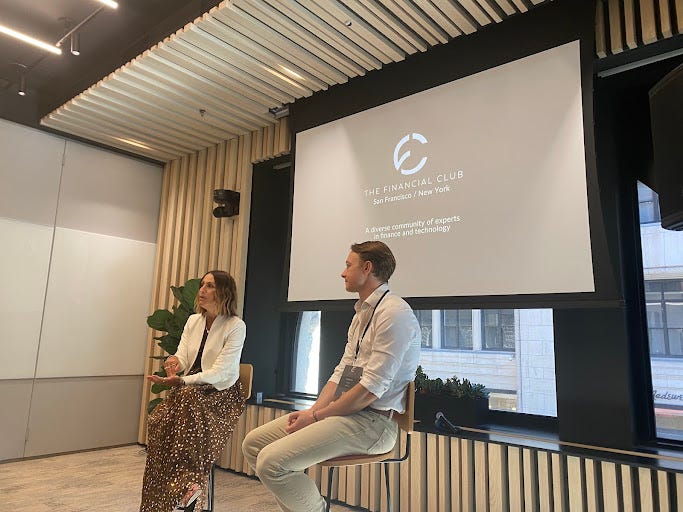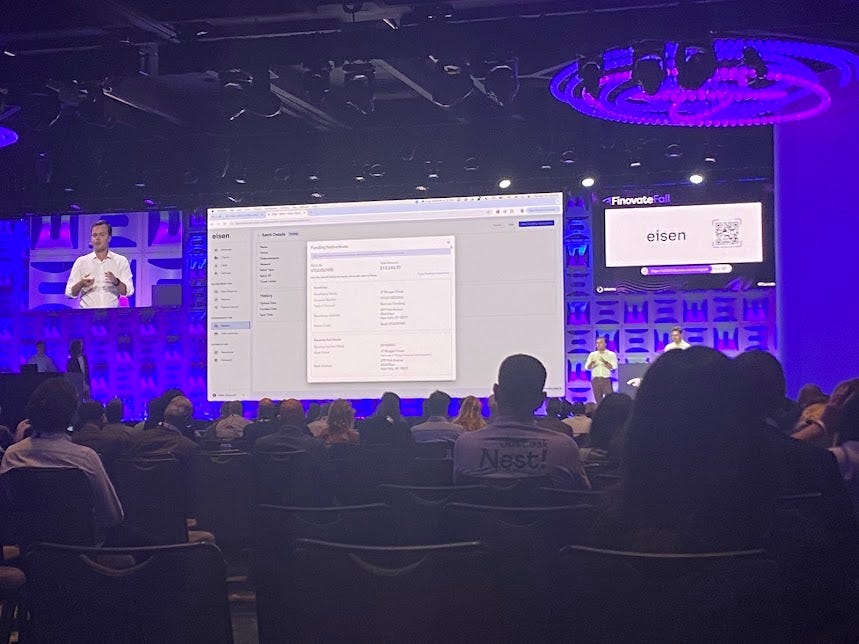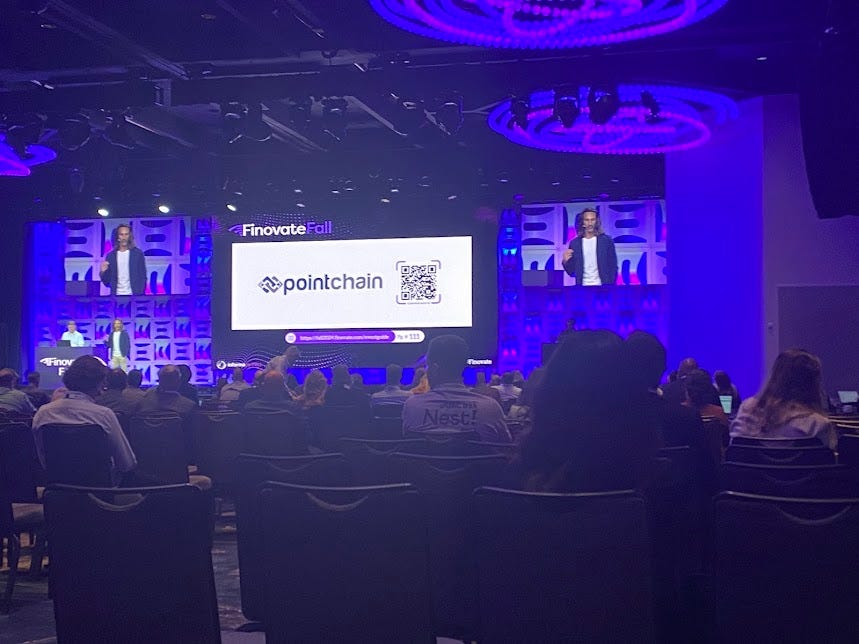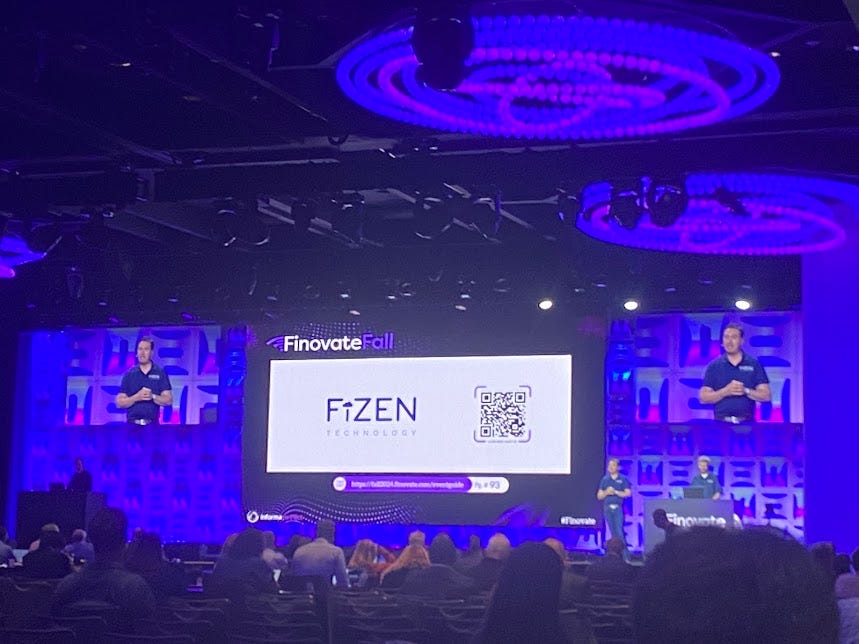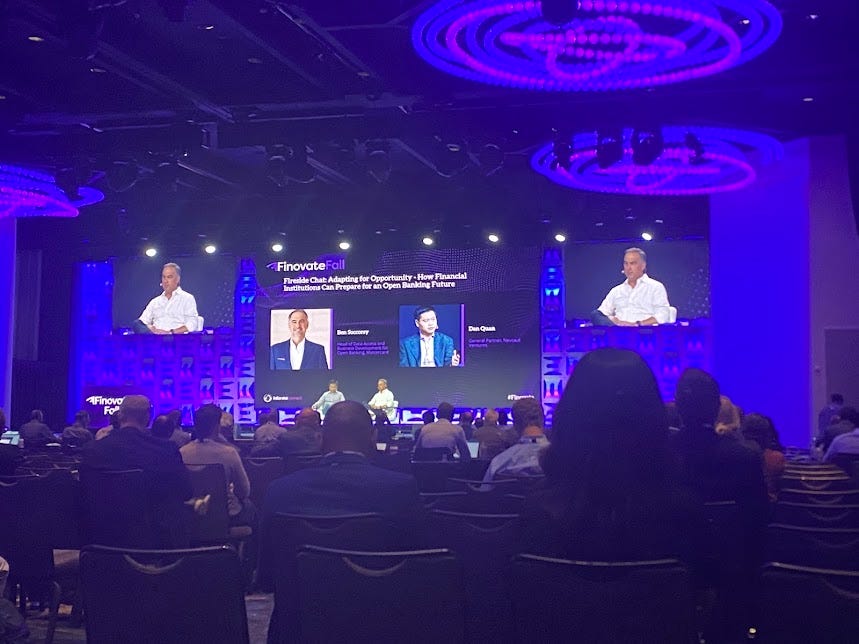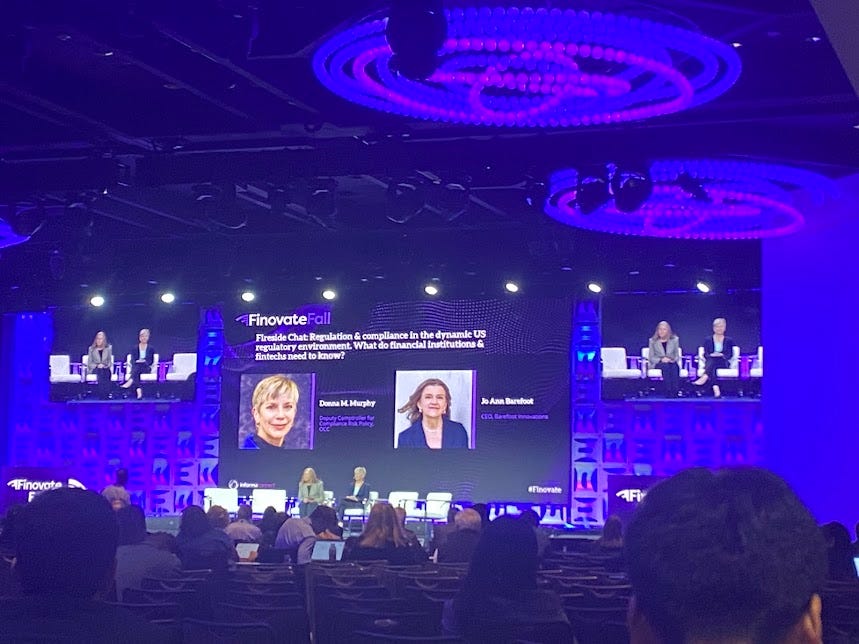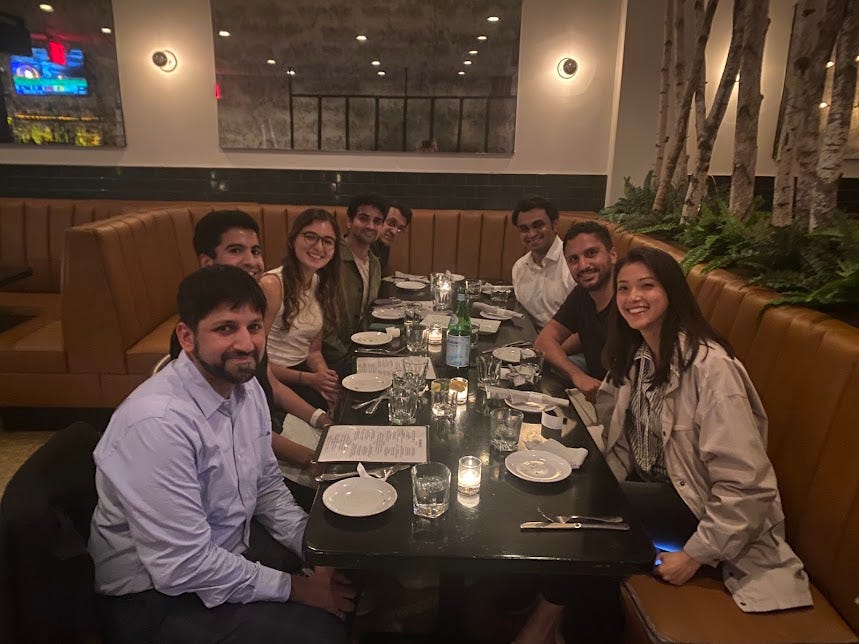FinovateFall 2024 Day 2 Recap
Summarizing session details, an after-hours event, and my overall thoughts on the day.
Day 2 was another super busy day, which took us all across town. Here’s the download:
The Financial Club Fireside Chat & AMA on Payments
To kick off the day, I hiked over to Mastercard’s midtown Tech Hub on 5th Ave where the Financial Club hosted its monthly breakfast, with this month’s edition featuring a fantastic payments panel of Stephany Kirkpatrick, founder and CEO of Orum, and Bradley Riss, President of Meridian. After some light networking and breakfast, some of the topics that were hit on:
The history of both leaders and what led them to entrepreneurship, with Stephany originally doing financial planning and then doing digital strategy in a variety of industries before starting Orum in 2019, while Bradley spent time at various payments-driven organizations before branching out on his own this past year with Meridian.
A reality check for everyone about how actually slow things are for payments here in the US, thanks to the nature of ACH (following bank hours and operating under constraints that seemed to make sense when there was a world with no Internet)
Evaluating banks’ current approach especially with regards to interest
What it might take to move the needle and see more adoption of real-time payments, similar to what has taken hold in Europe, Brazil, India, and other markets
I encourage folks to consider becoming members of the Club, especially if you live in SF and NY as events are held in both locations and are very regular.
Then we headed back uptown for Finovate, where the rest of the day featured a mix of demos and talks, including running into some old friends and even former colleagues, and making some new connections.
Demos
On day 2, due to events like the above and the rest of my schedule I was once again unable to catch all the orgs that were highlighted in my preview, but I did spend some time hearing from the following organizations which I felt added a Compliance, Risk, or regulatory lens to their demos:
Eisen’s focus is on the part of handling financial services customers that no one likes to talk about - when their accounts get closed. One of the big topics that even fewer people have even heard of is escheatment. Essentially, if an account appears to be abandoned/dormant/untouched after a certain period of time, many states have laws on the books that require institutions to remit the funds to them as unclaimed assets.
Their goal isn’t just to show you how to make the state happy, though. They have tools built in to try and help you with your last ditch contact efforts, and actually re-establish the relationship if at all possible.
The main feature that was shown off was what they called a “Disbursement Hub Batch,” which allows companies/institutions to not have to deal with every state separately, whether it’s for escheating or re-contact purposes (presumably). They can handle up to 100K accounts over a few days. The hub is pretty versatile as it can also be used for mass shutdowns or refund campaigns.
The goal of this company is to allow financial investigations from flagged transactions, and features transaction review and a client management system
Flagged transactions have a reason code and amount, with historical transactions also visible. Essentially, they are focusing on creating auditability in the actions taken by the analyst or transaction reviewer.
There is also a CIP component as a second layer, which the tool has been able to automate along with a risk assessment of the counterparty (with the focus on counterparties meaning this is not just a KYC effort but also extends to KYB). AI can be used to get more insights/intelligence on counterparties.
The final layer of the tool is the client management system, which they say helps banks struggling with disparate technologies by pulling in information from various systems to give a holistic view of a bank’s clients.
This company has been around for 10 years and says they are a RegTech solution. Not to be confused with another Fizen that is a crypto superapp (at this conference, the word “crypto” seemed like it was never uttered once)
They touted their policies and procedures and that they were SOC2 compliant (which always makes compliance folks like me super intrigued/happy).
They appreciate that companies have to use a large number of systems, so they touted the fact that users can choose to only use the backend/APIs and not have to utilize their front-end, with some presumably customizable integration capabilities.
Their key product is called “Verify” and it digs into various dimensions including BSA/AML, risk prevention, complaints, other letter regs, and can log the results/status for each company.
The tool doesn’t host data, but rather works with the third parties you’re integrated with to pull into an isolated place of analysis. Their motto - “you own your data”.
Talks
I managed to catch a few talks that tapped into regulatory topics as well.
“Special Address: Adapting for Opportunity - How Financial Institutions Can Prepare for an Open Banking Future”
This talk was a discussion between Ben Soccorsy, head of data access and business development for open banking at Mastercard and Dan Quan, General Partner at Nevcaut Ventures.
The discussion got into a lot of what we had heard about the day before at the NYPAY event on open banking, including the history of 1033 and open banking generally, with a special note being that Dan was involved in the initial CFPB rule making for 1033 when he served at the Bureau.
There were three things that the panel sought to emphasize - 1) This rule could have a huge impact on loan terms and more broadly on financial inclusion 2) There’s new opportunities for collaboration that could emerge, expanding on what the FDE has already put in place 3) Consumer demand for open banking is actually massive (even if they don’t know it by that name).
We heard a bit about Mastercard’s data responsibility principles. “Consumers own their data.” (My comment, thinking about some of the commentary from the night before - if consumer truly own their own data, why can’t they write to it from anywhere?)
Consent and third party risk management are still very much in play from a requirements perspective as open banking is built out.
“Fireside Chat: Regulation & compliance in the dynamic US regulatory environment. What do financial institutions & fintechs need to know?”
On paper this seemed like an exciting discussion. You had JoAnn Barefoot who is a powerful voice in the fintech/banking/payments space with her past as a regulator and experience shaping policy, and her current work at Alliance for Innovative Regulation. And you also had Donna Murphy who is the deputy comptroller at the OCC.
But my takeaway was that as you might expect from a regulator, they didn’t really give away too much in terms of what they were thinking. For example, we got an overview of the OCC and its remit, but not details of the focus areas/hot topics they think institutions should focus on. I will say I have been to other events where regulators are a bit more transparent with guidance.
The discussion focused on the definition of what AI is - this can refer to a huge range of tech and use cases. Traditionally, banks have been cautious and only focused on piloting AI. Gen AI however is a different story, not limited to original programming. Data related risks are magnified. Strong risk management is a good defense, and in fact many of the same principles apply to older tech.
The OCC itself is also looking at how they can use AI internally. It was interesting to hear that the usage of AI agents is not off the table even for the agency.
The agency talked about how it collaborates with other financial regulators. They keep in touch and try to share the best information for AML for example. Joint exams are performed for consumer regulations where possible.
We got some amount of insight on how regulators are trying to work together on third party risk management, with the interagency guidelines refresh as an example. BaaS is an undefined term, and there isn’t one specific model of how banks/fintechs can work together. Safety and soundness risks, consumer protection risk, fincrime risks, op risk, privacy/security were all noted.
Fintech Compliance Circle - our After-Hours Event
Closed out the day by hosting our second in-person meetup at Essex in the Lower East Side. We had a great time talking shop, industry trends, the state of compliance, and enjoying some great food and beverages. I want to thank all of our attendees for a great time and joining us; for those who could not attend look out for our next meetup!
Looking ahead
The demos have wrapped up, but today is the final day with some focused track-based talks. We’ll be back one more time with our final thoughts from the event. See you then!



